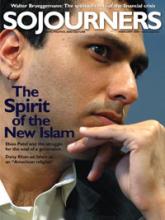Jesuit John Dear’s peace activism has led him all over the world, to war zones, meetings with figures such as Mother Teresa and Desmond Tutu—and jail. He spoke with journalist and musician John Malkin about his experiences and his new autobiography, A Persistent Peace: One Man’s Struggle for a Nonviolent World (Loyola Press).
John Malkin: In A Persistent Peace, you write, “The arrival of dawn comes at a high price. It requires good people to break bad laws.” Tell us about your experiments with breaking bad laws.
John Dear: I’m coming to the conclusion that peacemaking, like the spiritual life, or like life itself, is simply a journey. And living here in the United States has to mean resistance to the culture of war, injustice, greed, nuclear weapons, and so forth.
I’ve tried so many different ways to work for peace: writing books and letters, prayer services, speaking to millions of people, press conferences, met with every politician I could. Gandhi says, “After you’ve tried everything you can nonviolently, you have to cross the line and break the laws that legalize mass murder in your name. And accept the consequences.”
I’ll never forget being in prison with Philip Berrigan. It was horrible. There was nothing romantic about it. Yet more happened when I was in that tiny cell for eight months than all of the other things I’ve done for peace combined. There is a sort of inverse proportionality; the more you try to do for peace and justice, the less happens. It is very American to think “we’re in control, we’re going to end the war.” The more you let go and walk in faith, hope, and trust, and take a leap—a risk of nonviolence for the truth of our common humanity—the more can happen because then the God of peace can work through you.
Read the Full Article
